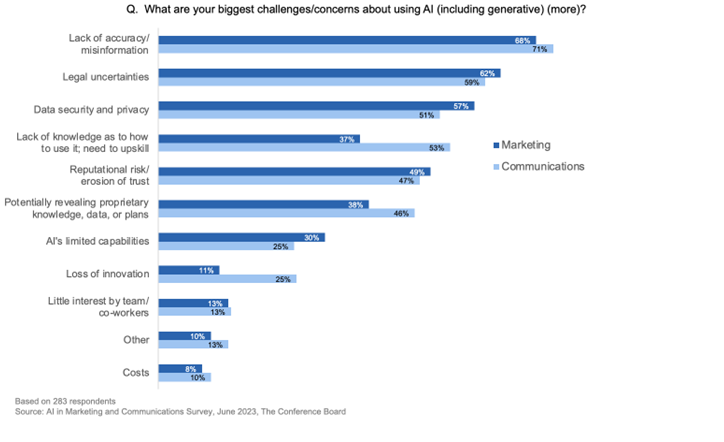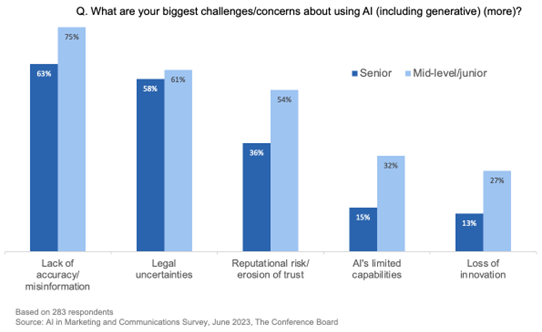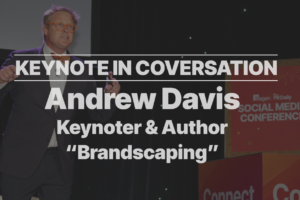This is what worries communicators, marketers most about AI
A new joint survey conducted by Ragan Communications and The Conference Board sheds light on what our industry sees as the biggest problems with generative AI.

Any technology developing as quickly as generative AI is going to encounter a few bumps along the road. Remember when the Bing AI technology (powered by ChatGPT) said it wanted to be alive and tried to get a New York Times columnist to leave his wife?
Good times.
But at least for those of us working in marketing and communications, AI tools gaining sentience and stealing our significant others isn’t the biggest concern — at least not yet.
In the “AI in Marketing and Communications Survey,” jointly conducted by Ragan Communications and The Conference Board in June, practitioners of both disciplines expressed concern about a variety of open questions that remain around the technology. Chief among them were lack of accuracy and misinformation, legal uncertainties and data security and privacy.

These concerns are all understandable in the context of the work that we do. The issues with AI hallucinations are well-publicized. Bots will very confidently cite facts, figures or even publications that simply do not exist. Without careful fact-checking, you can quickly find yourself in hot water. For communicators, there’s another lurking danger here: misinformation in the form of deepfakes. These images, videos and audio clips have the potential to undermine elections and steal celebrity likenesses to promote products — to say nothing of the even darker uses.
Legal uncertainties are also major obstacles to both marketers and communicators who’d like to incorporate AI into their workflows but feel the need to wait and see how court cases play out first. Artists, writers and others whose content trained the large language models are all bringing suits against various AI companies. Until those are settled, and the law is clear, questions lurk: can organizations face legal repercussions themselves for using outputs from generative AI?
Relatedly, communicators and marketers are also concerned about what happens to their own data once AI has it. Will it become part of the hive mind, forever able to be accessed by anyone? Is there any protection against this concern? We see the same issue cropping up lower down the list, with 46% of communicators and 38% of marketers also expressing fear of sharing potentially proprietary knowledge.
In all three of these examples, marketers and communicators shared similar levels of concern, with communicators slightly more concerned about misinformation and marketers more worried about data security and legalities. But while 53% of communicators are concerned about upskilling and training in AI, only 37% of marketers said the same.
There are multiple reasons for the potential discrepancy. Communications, of course, can include internal concerns, which can mean handling training and upskilling. It could simply be that communicators don’t find the tools as intuitive as marketers do or are trying to perform higher-level tasks.
Differences between senior-level and mid/junior
Career stage played a key role in the concerns professionals face over generative AI in the workplace. Our study found that while junior and mid-level workers are more likely to use AI tools (especially
marketers), they’re also generally more worried about the risks of the technology.

Those who are using the tools on a frequent basis are more likely to see the flaws and limitations rather than the possibilities based on hype and marketing. It makes sense. This is a reminder to senior leadership to really listen to what your team is telling you about the tool. Their on-the-ground perspective can help temper your enthusiasm and set realistic expectations for incorporating the tools in a way that makes sense but is sensitive to their drawbacks.
It’s not all gloom and doom
Obviously generative AI wouldn’t be garnering so much attention if it didn’t have great potential to improve the way we work, too. And overall, professionals expect AI to help far more than it’ll hurt — save for a few key areas.
Productivity gains are the major area of optimism, with 82% of respondents expressing the belief that AI will help them do their work faster. About half of respondents also believe the technology will aide in learning and development, business results and product or service innovation.
For the full results, download the report today.
Allison Carter is executive editor of PR Daily. Follow her on Twitter, LinkedIn or Threads.







